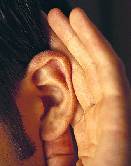- 8 Ways to Increase Dopamine Naturally
- 7 Best Breads for Maintaining Stable Blood Sugar
- Gelatin vs. Collagen: Which is Best for Skin, Nails, and Joints?
- The Long-Term Effects of Daily Turmeric Supplements on Liver Health
- Could Your Grocery Store Meat Be Causing Recurring UTIs?
- Are You Making This Expensive Thermostat Error This Winter?
- Recognizing the Signs of Hypothyroidism
- 10 Strategies to Overcome Insomnia
- Could Artificial Sweeteners Be Aging the Brain Faster?
- Techniques for Soothing Your Nervous System
Obesity May Be Hard on Your Hearing, Study Says


Listen up: Being obese, especially if you carry those extra pounds around your waist, might be linked to hearing loss, a new study suggests.
Researchers tracked more than 68,000 women participating in the Harvard Nurses’ Health Study. Every two years from 1989 to 2009, the women answered detailed questions about their health and daily habits. In 2009, they were asked if they’d experienced hearing loss, and, if so, at what age.
One in six women reported hearing loss during the study period, the researchers said.
Those with a higher body-mass index (BMI) or larger waist circumference faced a higher risk for hearing problems compared to normal-weight women. BMI is a measurement of body fat based on a ratio of height and weight.
Women who were obese, with BMIs between 30 and 39, were 17 percent to 22 percent more likely to report hearing loss than women whose BMIs were less than 25.
Women who fell into the category of extreme obesity (BMIs over 40) had the highest risk for hearing problems — about 25 percent higher than normal-weight women.
Waist size also was tied to hearing loss. Women with waists larger than 34 inches were about 27 percent more likely to report hearing loss than women with waists under 28 inches. Waist size remained a risk factor for hearing loss even after researchers factored in the effects of having a higher BMI, suggesting that carrying a lot of belly fat might impact hearing.
Those differences remained even after researchers controlled for other factors known to affect hearing, such as cigarette smoking, the use of certain medications and the quality of a person’s diet.
One thing that seemed to change the relationship was exercise. When researchers factored physical activity into the equation, the risk for hearing loss dropped. Women who walked for four or more hours each week saw their risk for hearing loss drop by about 15 percent compared to women who walked less than an hour a week. The researchers said that suggests exercise protects against hearing loss.
The findings were published in the December issue of the American Journal of Medicine.
The study showed only an association, however, and didn’t prove that obesity directly harms hearing. The researchers said they aren’t sure why the two conditions might be related, but they have some theories.
“The ear is highly metabolically active, so that means it’s really dependent on having adequate blood supply,” said study author Dr. Sharon Curhan, an instructor in medicine at Brigham and Women’s Hospital in Boston.
Obesity can compromise blood flow by narrowing blood vessels. People who are obese also are more likely to have high blood pressure, another condition that can hamper blood flow.
“Obesity and factors that obesity brings on may compromise blood flow to the cochlea,” Curhan said. The cochlea is the hearing chamber of the inner ear. Curhan said lack of blood flow could prevent the cochlea from restoring itself after damage, gradually diminishing its function.
An expert who was not involved in the study said the research raised important questions.
“It’s an excellent starting point, and a strong suggestion,” said Dr. Ian Storper, director of the otology program at the New York Head and Neck Institute’s Center for Hearing and Balance Disorders at Lenox Hill Hospital in New York City.
Storper said the study relied on participants to report their own hearing loss. They weren’t given hearing tests, which might have skewed the results.
Another expert said it might be time to count hearing loss as yet another way obesity harms the body.
“This is intriguing to me, and it is worrisome,” said Dr. Michael Weitzman, a professor of environmental medicine and pediatrics at New York University’s Langone Medical Center.
In June, Weitzman published a study in the journal Laryngoscope that found obese teenagers had almost twice the risk for early hearing loss as normal-weight teens.
“[The new study] supports what we found,” he said.
“I think there’s a reason to begin to think that this is a problem that’s associated with obesity,” Weitzman said. “You might want obese kids or adults who have … academic problems to have their hearing checked.”
More information
For more on overweight and obesity, visit the U.S. National Heart, Lung, and Blood Institute.
Source: HealthDay
Copyright © 2026 HealthDay. All rights reserved.










